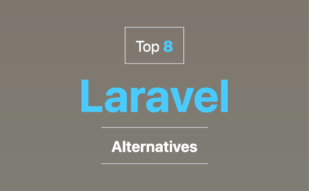PrestaShop is an open-source eCommerce solution founded in 2005 in Paris. Offering customizable themes, a wide selection of payment options, and secure transactions, PrestaShop empowers merchants with full ownership of their online stores. With 300k+ merchants on board, it has seen continuous growth in store numbers and popularity.
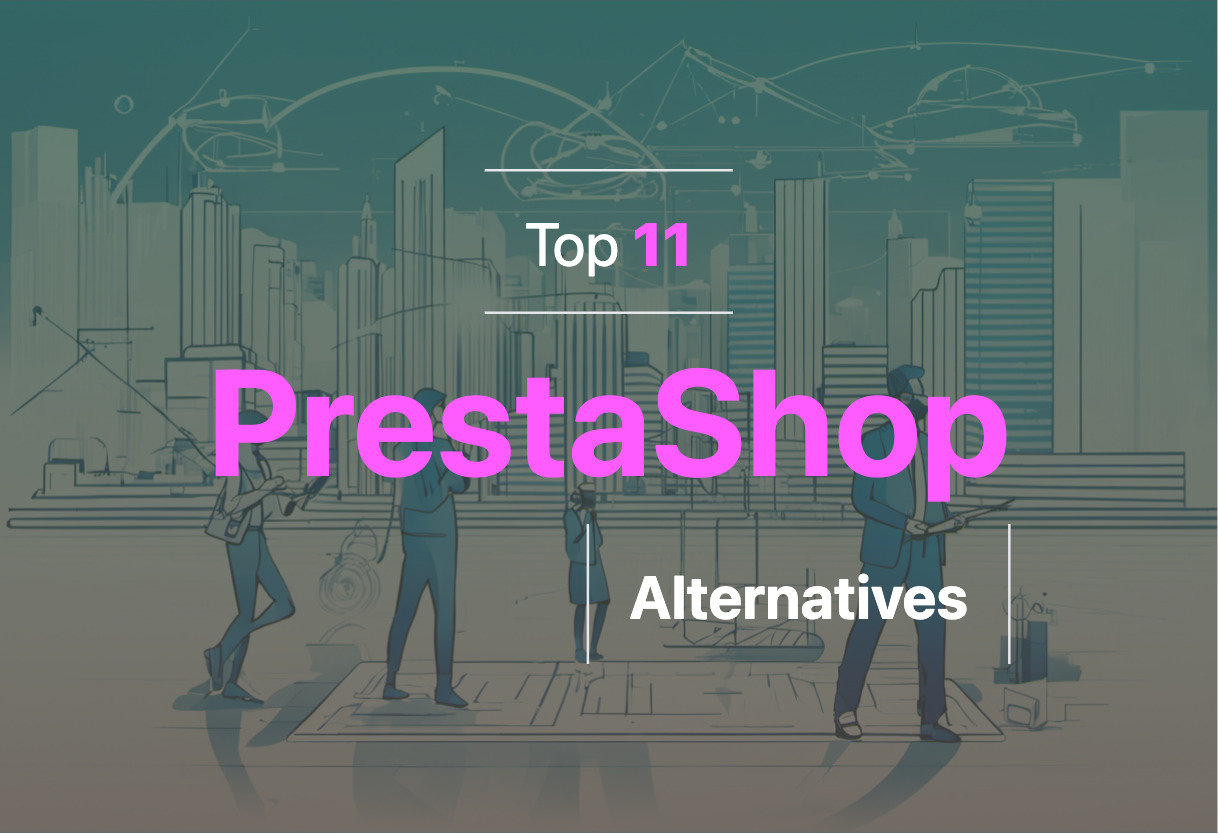
For those exploring alternatives to PrestaShop, options encompass Magento, OpenCart, WooCommerce, Shopify, Adobe Commerce, BigCommerce, Squarespace, Etsy, WordPress, Drupal, Laravel, and more.
Magento
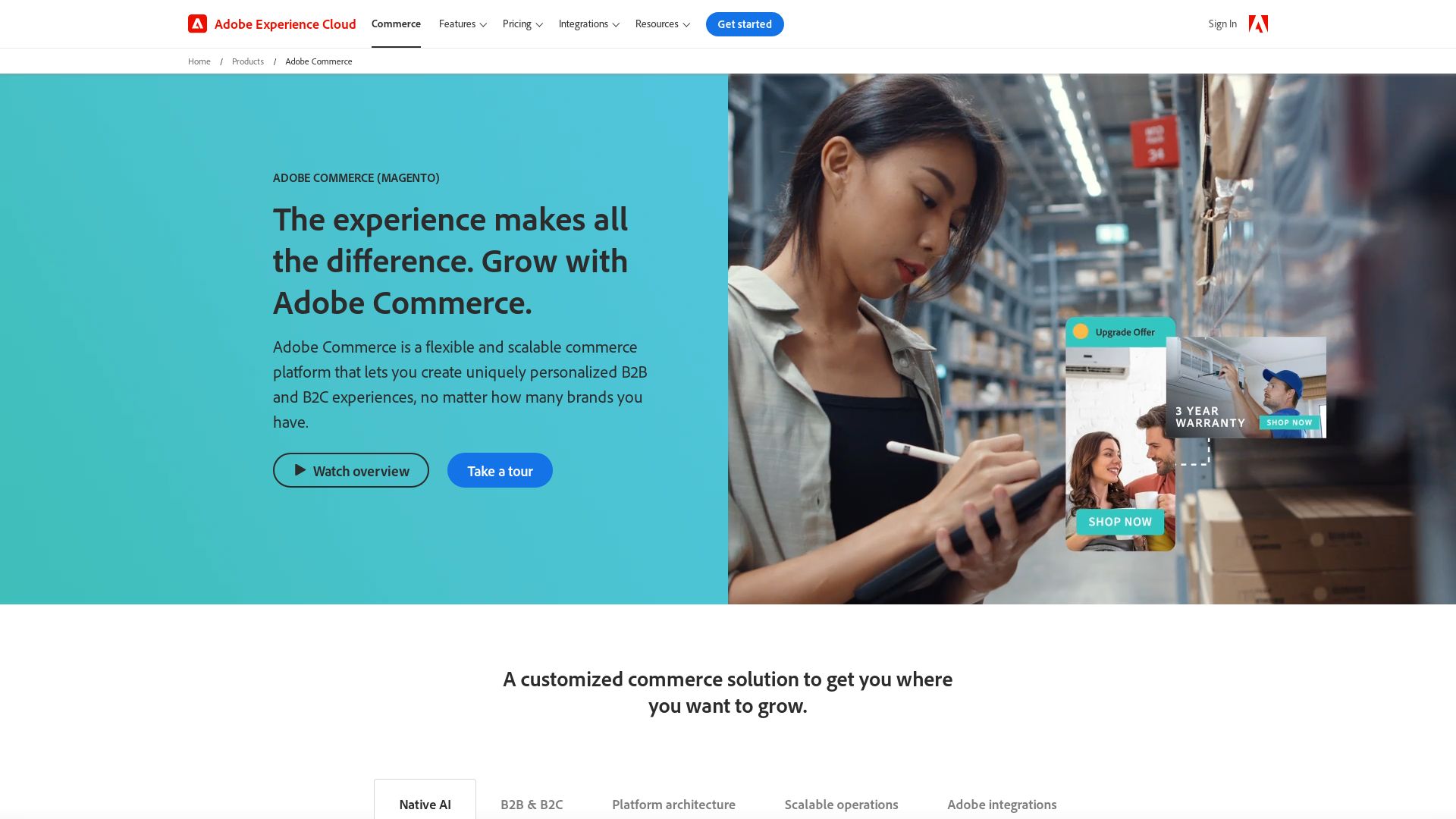
First emerging in 2008, Magento has risen to e-commerce dominance, holding over 30% of the total market share with more than 250,000 merchants globally trusting its powerful open-source platform. With three editions specially designed for businesses of different scales, Magento presents a comprehensive e-commerce solution.
Best Features of Magento
- Scalable with business growth – available in Community edition for SMBs, Commerce edition for larger businesses with hefty product catalogs, and Commerce Cloud edition for large businesses seeking advanced functions.
- Empowering customization with over 3000 extensions – tailoring the platform to your unique e-commerce needs.
- Proven security – particularly with the Enterprise Edition that ensures PA-DSS compliance for the protection of customers’ sensitive information.
- Powerful SEO and digital promotion tools – lending their power to boost your store’s visibility online.
| Magento Edition | Best For |
|---|---|
| Magento Community (Open Source) | SMBs seeking cost-effective, flexible solutions |
| Magento Commerce | Larger businesses requiring scalability and performance enhancements |
| Magento Commerce Cloud | Major businesses in need of avant-garde functionalities |
Magento Downsides
- Potentially high development cost due to customization needs.
- Limited technical support within Magento’s own functionalities.
- Complexity of use compared to simpler platforms like Shopify.
Magento Pricing
The pricing for Magento varies based on the selected edition and other factors. While Magento licenses are free, additional expenses can arise, for example, from hosting fees, extension costs, and annual sales for the Commerce and Commerce Cloud editions. An investment in Magento can range from $12,000 to $57,000+ in total development fees for the Community edition, while the Enterprise edition can start around $18,000 annually. Careful consideration of Magento development costs is vital for your eCommerce venture’s financial sustainability.
Magento Use Cases
Magento for SMBs
With its Community edition, Magento delivers budget-friendly scalability and flexibility that SMBs require, letting them build their e-commerce presence effectively.
Magento for Large Businesses
The Magento Commerce edition handles larger product catalogs optimally, while equipping organizations with performance enhancements essential for their growth.
Magento for Eco-Commerce
Sustainability-focused businesses can leverage Magento’s open-source platform for green innovation, contributing to a better digital future.
OpenCart
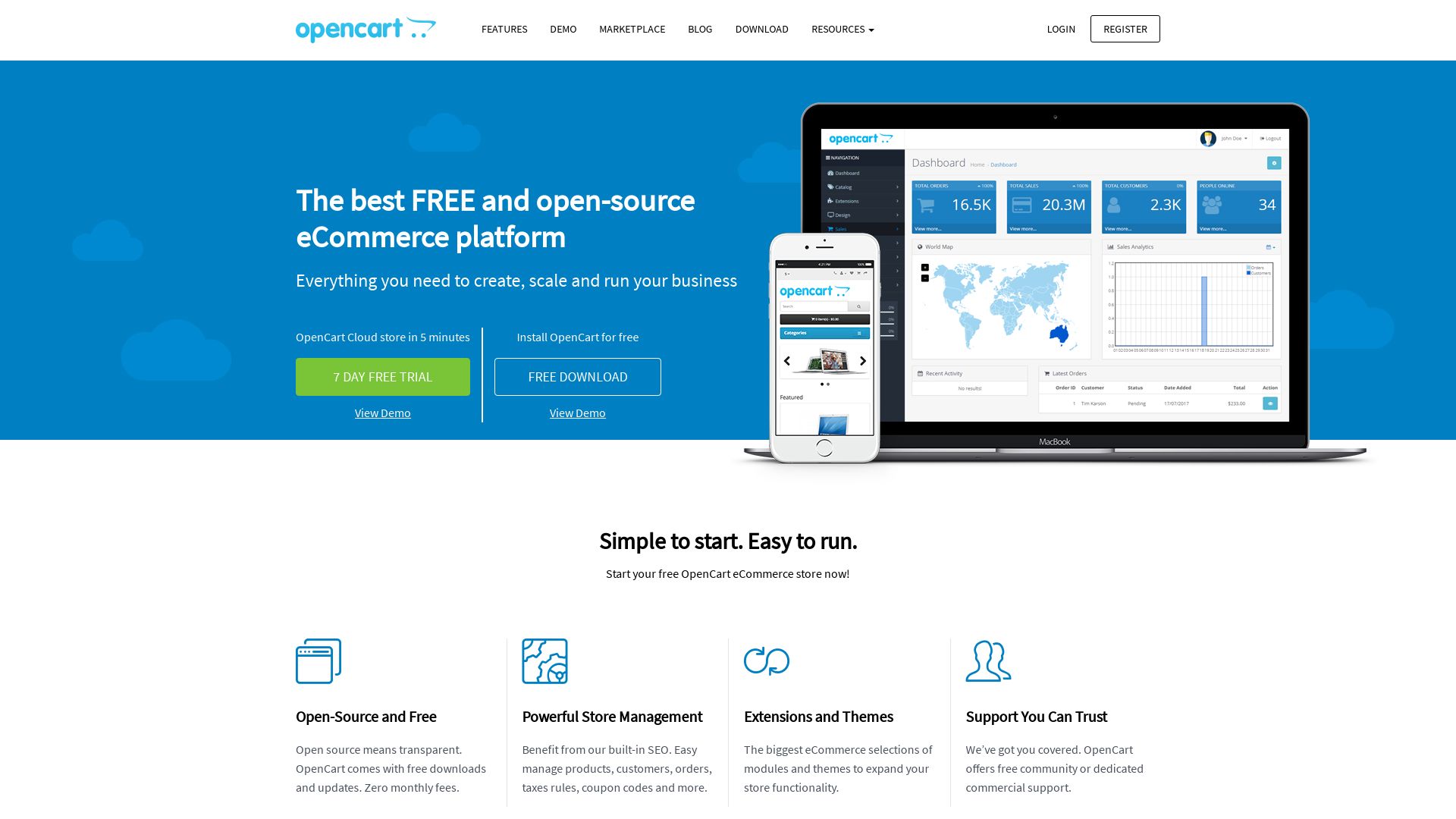
Designed as a powerful yet user-friendly platform, OpenCart is a notable alternative in the realm of e-commerce. Its free, open-source nature combined with customization features means entrepreneurs can shape their online store to fit their needs.
OpenCart Top Features
- Flexibility with an open-source platform allowing for source code modifications.
- Convenient Admin Dashboard for comprehensive analysis of store performance.
- Highly customizable with support for unlimited categories, products, and manufacturers.
- Optimized for SEO and designed to be mobile-responsive by default.
- Allows for different user access roles, facilitating multifaceted webstore control.
- Coupled with Multilingual and multi-currency support, catering to a global customer base.
- Backup and restore tools to safeguard your data.
| Key Advantage | Details |
| Digital Product Sales | OpenCart supports the sale of digital products in addition to physical ones, catering to a diverse range of sellers. |
| Payment Gateways | Adapts to hundreds of different payment providers, ensuring a seamless checkout process for customers worldwide. |
| Discounts And Promotions | Proficiently manage promotional campaigns with its Discounts, Coupons, and Specials feature. |
OpenCart Limitations
- Demands technical knowledge for optimal performance.
- Functionality can be limited without extensions, and not all may work correctly.
- May not be suitable for high-level, large-scale online stores.
- Can run slowly and SEO needs separate attention.
OpenCart Pricing
Access to the OpenCart platform is free. However, costs may be incurred for hosting and acquiring any additional extensions vital to your store’s design and functionality.
OpenCart Use Cases
Use Case 1: Startups
Cost-effective and time-efficient, OpenCart is an excellent choice for startups looking to establish an online presence. Since it requires a minimal initial investment, it’s the ideal place to launch new ideas.
Use Case 2: Small to Medium Businesses
With its easy setup, variety of theme options, and customizable features, OpenCart suits small to medium businesses venturing into e-commerce or upgrading their existing platforms.
Use Case 3: Multilingual Retail Platforms
OpenCart’s multilingual support makes it apt for businesses reaching out to customers across the globe. It’s a practical solution for managing multiple retail platforms in different languages.
Laravel
An eminent figure in the domain of eCommerce development, Laravel has established its stature as a popular PHP framework. Its commanding presence, affirmed by a market share of 35.87% amongst PHP frameworks and usage by over 1,111 eCommerce websites, is a testament to its prowess.
Laravel’s Premier Features
- An expressive syntax that augments efficient production.
- Built-in libraries and pre-made packages that facilitate creation of comprehensive eCommerce sites.
- High scalability and security features that cater to both server-side and application-side needs.
- Extensive support for complex web applications with straightforward migration.
- Pre-installed libraries and packages, leading to structurally sound formation of projects.
| Feature | Benefit |
|---|---|
| Support for Model-View-Controller (MVC) Architecture | Promotes lean coding whilst enforcing scalability of applications |
| Elegant Tools like Artisan Command-Line Interface | Assists in eliminating redundancy, thus saving costs and time |
| Robust Ecosystem including Laravel Forge, Laravel Envoyer, and Laravel ecommerce plugins | Enables the creation of eStores with custom features and functionalities |
Limitations of Laravel
- Potentially high learning curve for beginners due to expressive syntax.
- Necessity of thorough planning and evaluation for larger scale projects.
- Could require assistance from job-specific Laravel development firms for optimal usage.
Laravel Use Cases
USE CASE 1: eCommerce Business
Laravel provides a secure, scalable platform for all kinds of eCommerce businesses, from small startups to large enterprises. Its expressive syntax, high scalability, and robust libraries remove the need for redundant coding, bolstering the development of seamless, customer-centric online stores.
USE CASE 2: Mobile App Development
With the rise of smart devices, Laravel is the ideal solution for web and mobile app development. It provides integrations with user interfaces like mailing lists and supports custom web application development.
USE CASE 3: Large Scale Projects
Given proper planning and evaluation, Laravel is immensely suitable for large scale projects. With provisions like Model-View-Controller (MVC) architecture, Laravel is capable of handling complex structures and applications, thus justifying its significant market share.
WooCommerce
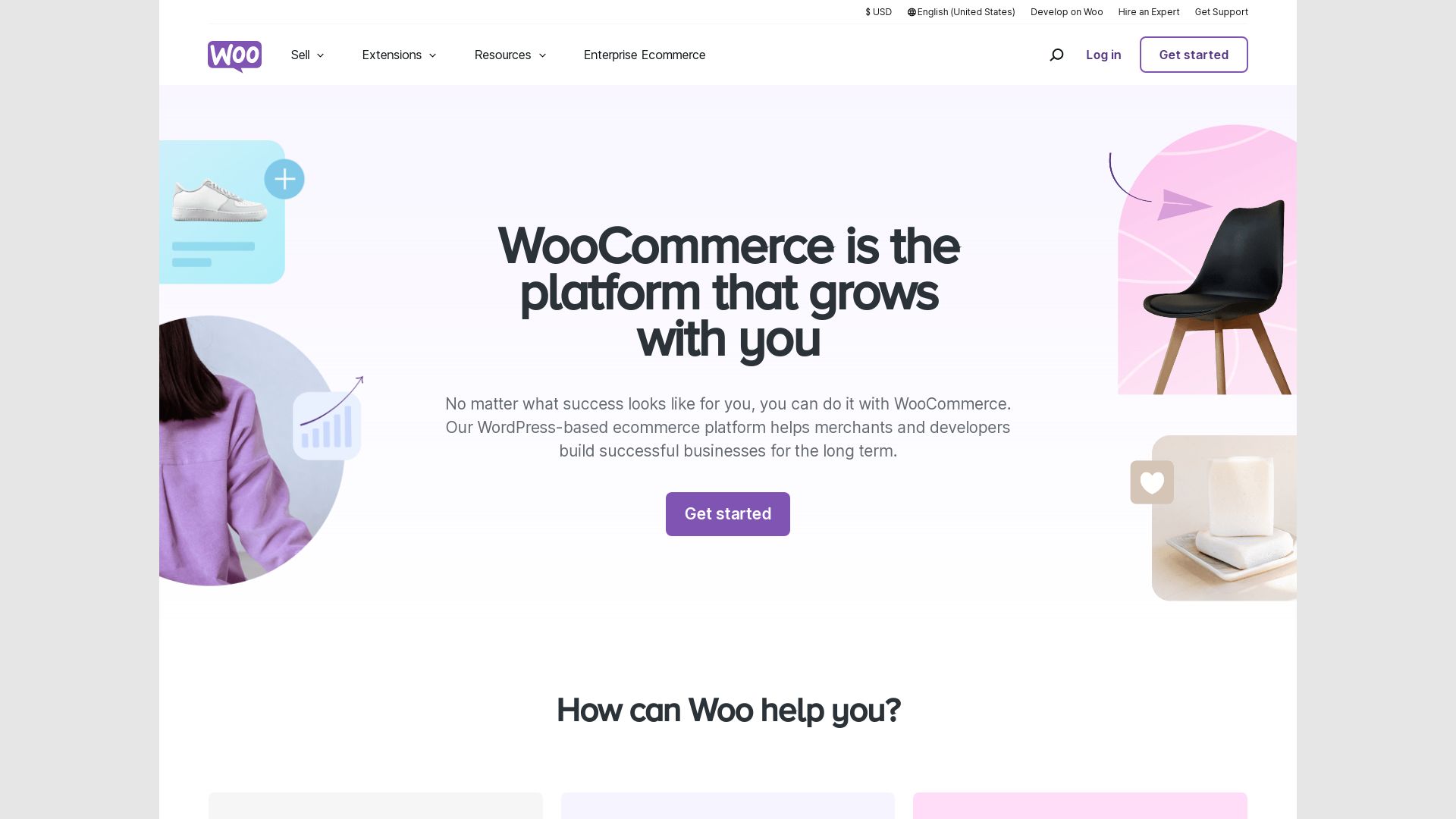
In the expanse of ecommerce domains, WooCommerce emerges as a potent choice. Utilized by an impressive percentage of the top million ecommerce sites, it has helped in the creation of 3.9M online stores.
WooCommerce Top Features
- Open-source platform for unlimited customization.
- Integration with 140+ payment gateways ensuring vast transactional ease.
- Mobile-ready designs and secure payment portals for heightened user experience.
| Full Customization | SEO Optimization |
|---|---|
| WooCommerce offers a customizable platform allowing complete control over the look and functionality of the store. | Equipped to enhance discoverability with inbuilt SEO faculties. |
| User Friendly | Extension Additions |
| Intuitive and user-friendly, beneficial for businesses of all scales. | Comprehensive marketplace with extensions and themes to bolster capabilities. |
WooCommerce Limitations
- Limited to WordPress websites, restricting its use to the WordPress community.
- May require substantial customization to meet unique business needs.
WooCommerce Pricing
As an open source platform, WooCommerce comes free of charge. However, certain extensions and features may attract additional costs.
WooCommerce Use Cases
Use case 1
An existing WordPress site looking to extend into ecommerce can effortlessly metamorphose with WooCommerce.
Use Case 2
A high-volume store desiring a blend of aesthetics, functionality, and customization finds an ally in WooCommerce.
Use Case 3
A small business wishing for a user-friendly platform to set up an online store, WooCommerce’s intuitive interface aids in seamless establishment.
Shopify
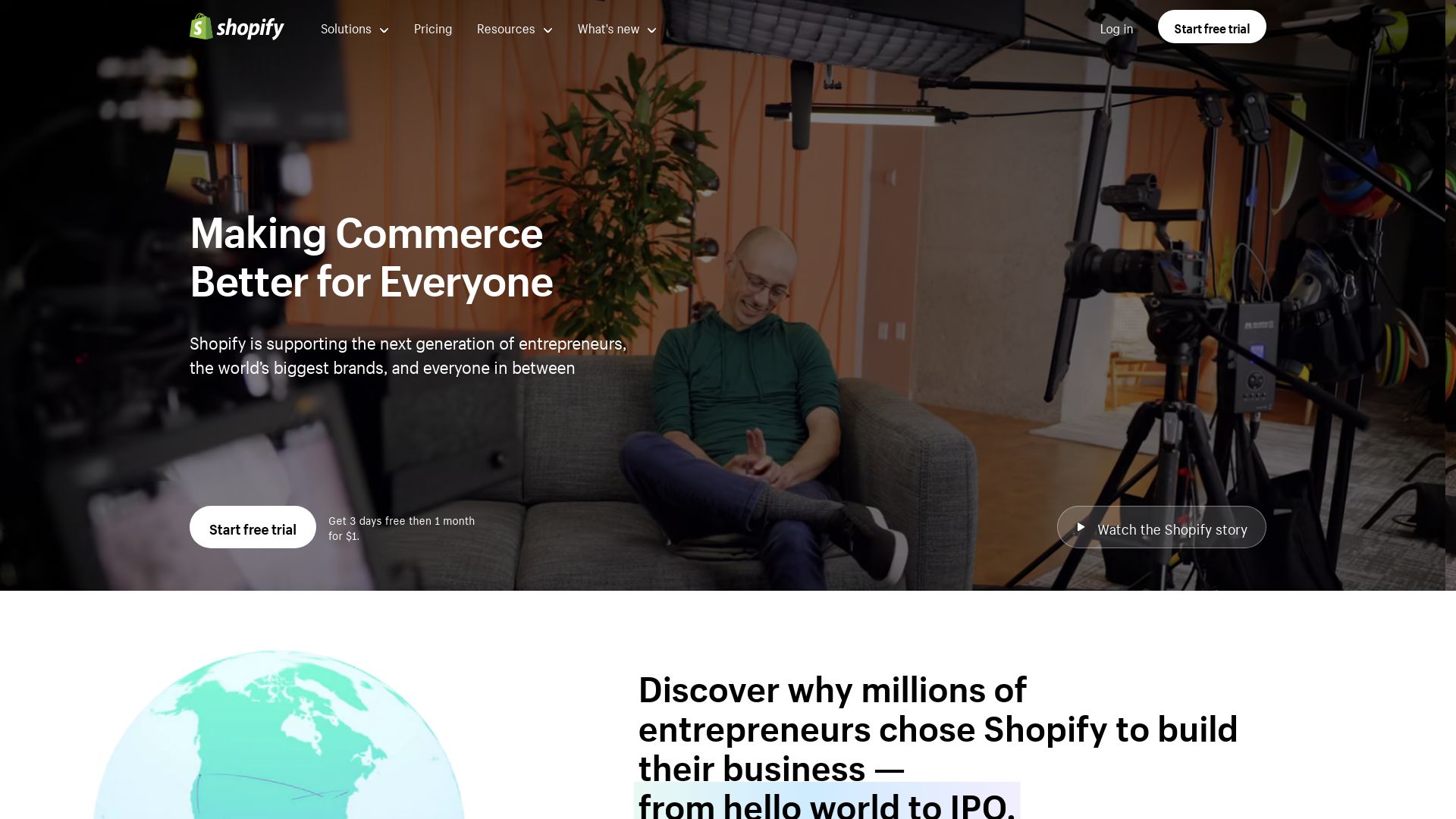
The rebel of eCommerce platforms, Shopify is a notorious one-stop-shop for everything eCommerce. With a plethora of affordable, pre-made templates, it’s a playground for those ready to venture into the eCommerce universe.
Shopify Top Features
- In-built SEO tools: Shopify recognises the beast that is SEO, acknowledging that nearly 43% of eCommerce sales spring from search engines.
- Customization: Shopify empowers store owners to select from a myriad of templates or opt for a completely custom website design.
- Third-Party Integrations and Custom Functionality: Shopify works seamlessly with your ERP and CRM systems. Customize away!
- Brand-Tailored Aesthetics: With Shopify, your brand stands out from the crowd. Be audacious, be bold!
| Unique Page Templates | From product pages, blog pages, to category pages, Shopify design has you covered. |
| Acceleration Programme by Eastside Co | Launch your dream store in under four weeks. Fast track to success. |
| Highly Engaging Features | Adventure into the dynamic world of carousel slides, promotion and discount tools, wishlist creations, and more. |
Shopify Disadvantages
- Limited customization with pre-made templates may not always translate into unique, brand-specific aesthetics.
- Sourcing custom website design services require going beyond Shopify’s boundaries. Get ready to partner with third parties or professional web design agencies.
- Costs can escalate quickly. Could be a bitter pill to swallow for newcomers to the eCommerce world.
Shopify Pricing
Shopify sends tremors with its pricing. Straddle a monthly subscription range from $29.99 to $299.99, get ready for additional template costs, custom website design price tags and more functionality bills. With extensive projects, the cost can rocket beyond $100,000.
Shopify Use Cases
eCommerce Beginners
For those venturing into the eCommerce universe, Shopify is the guardian angel. With an array of affordable, pre-made templates, it’s a launching pad to success.
Brand Oriented Businesses
For brands with daring aesthetics, Shopify’s custom designing allows you to showcase your unique personality in the crowded e-marketplace.
Fast-Paced Entrepreneurs
With Shopify and the Accelerator Programme by Eastside Co, see your eCommerce dream turned into a reality in under four weeks. Time’s ticking, let Shopify hold your hand.
Adobe Commerce
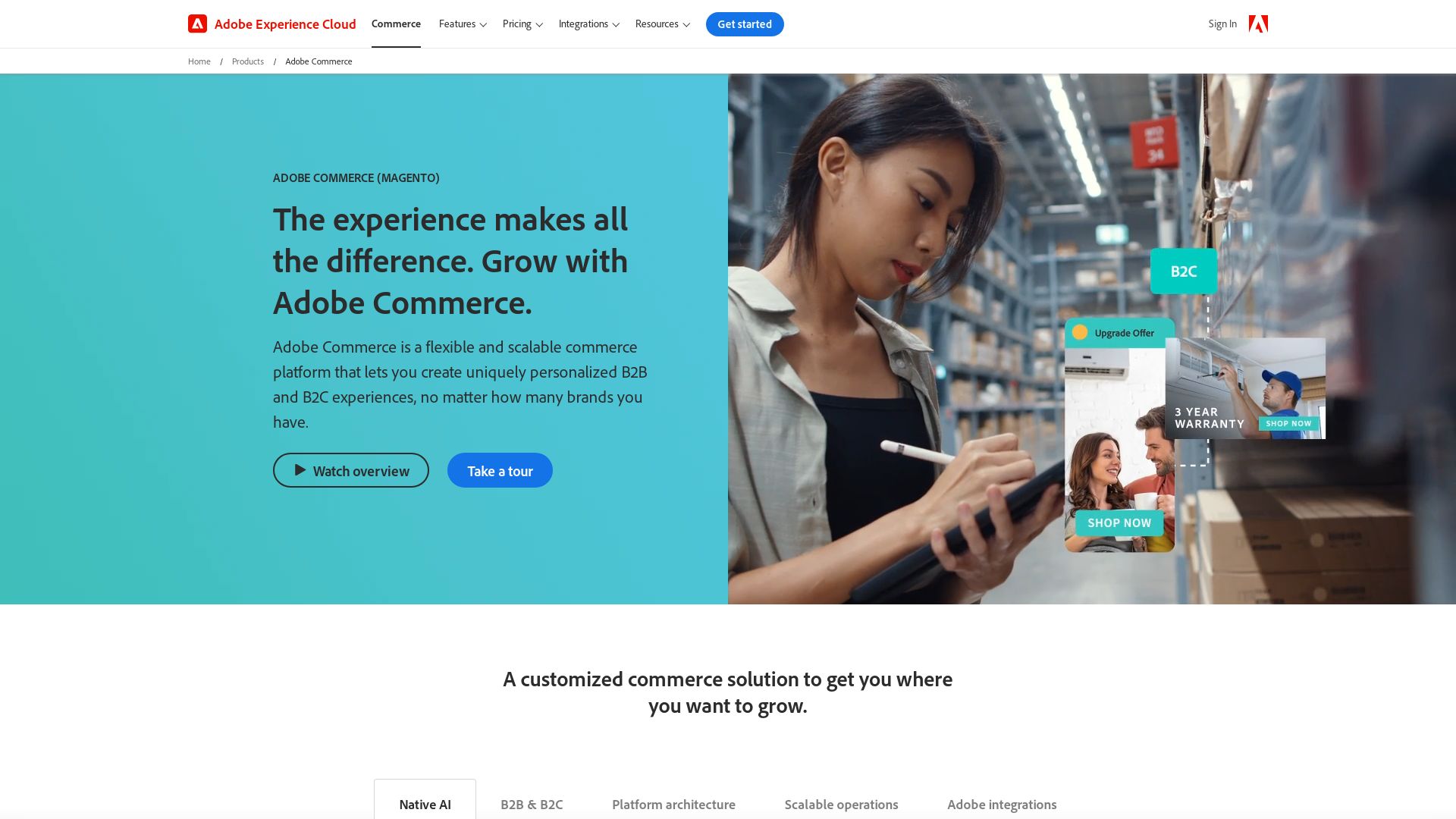
A relative newcomer to the ecommerce sphere, Adobe Commerce burst onto the scene in 2019, following the integration of Magento Commerce into Adobe’s suite of cloud services. With its robust suite of features and extensive customization capabilities, Adobe Commerce is poised to be a powerful player in the ecommerce space.
Adobe Commerce Top Features
- Strong integration with Adobe’s broader suite of cloud tools, including Adobe Analytics Cloud, Adobe Marketing Cloud, Adobe Advertising Cloud, and Adobe Experience Manager.
- Open-source platform, offering extensive customization opportunities through the PHP-based Magento system.
- Strong reporting functionality and comprehensive suite of analytical tools.
- Responsive web design, providing a seamless user experience across multiple devices.
- Extensive SEO optimization, including Google sitemap generation and customizable meta keyword descriptions.
| Features | Description |
|---|---|
| Marketplace extensions | Can be separately purchased to boost website functionality. |
| Content Management System | Easy product uploads. |
| Augmented Reality Catalog Integration | Enhances user engagement. |
Adobe Commerce Downsides
- High cost of development, particularly for enterprise-level stores, involving six-figure expenses for setup and additional costs with increased complexity and integration requirements.
- Opaque pricing model, which can be a barrier to entry for many smaller businesses.
Adobe Commerce Pricing
Adobe Commerce operates on a licensing fee structure; the infrastructure cost is included in this fee owing to the cloud-based nature of the enterprise product. Note, additional costs can arise with extended customizations and usage of certain advanced features. While the Magento Open Source is free, users will incur costs for hosting, development, and extensions.
Adobe Commerce Use Cases
Use case 1: Large Businesses
With its extensive analytical tools, impressive integration capabilities, and scalability, Adobe Commerce is a fitting choice for large businesses looking to build complex, customised online stores.
Use case 2: Medium Businesses
Medium-sized businesses that already lever heavily on Adobe services may find Adobe Commerce’s seamless integration with other Adobe Cloud tools significantly beneficial for their operations.
Use case 3: Business with Unique Selling Propositions
Adobe Commerce’s open-source customization and ‘Differentiate through Development’ approach empower businesses to craft unique online stores tailored to their sophisticated selling scenarios or intricate UX requirements.
BigCommerce: The Playful Protagonist in eCommerce World
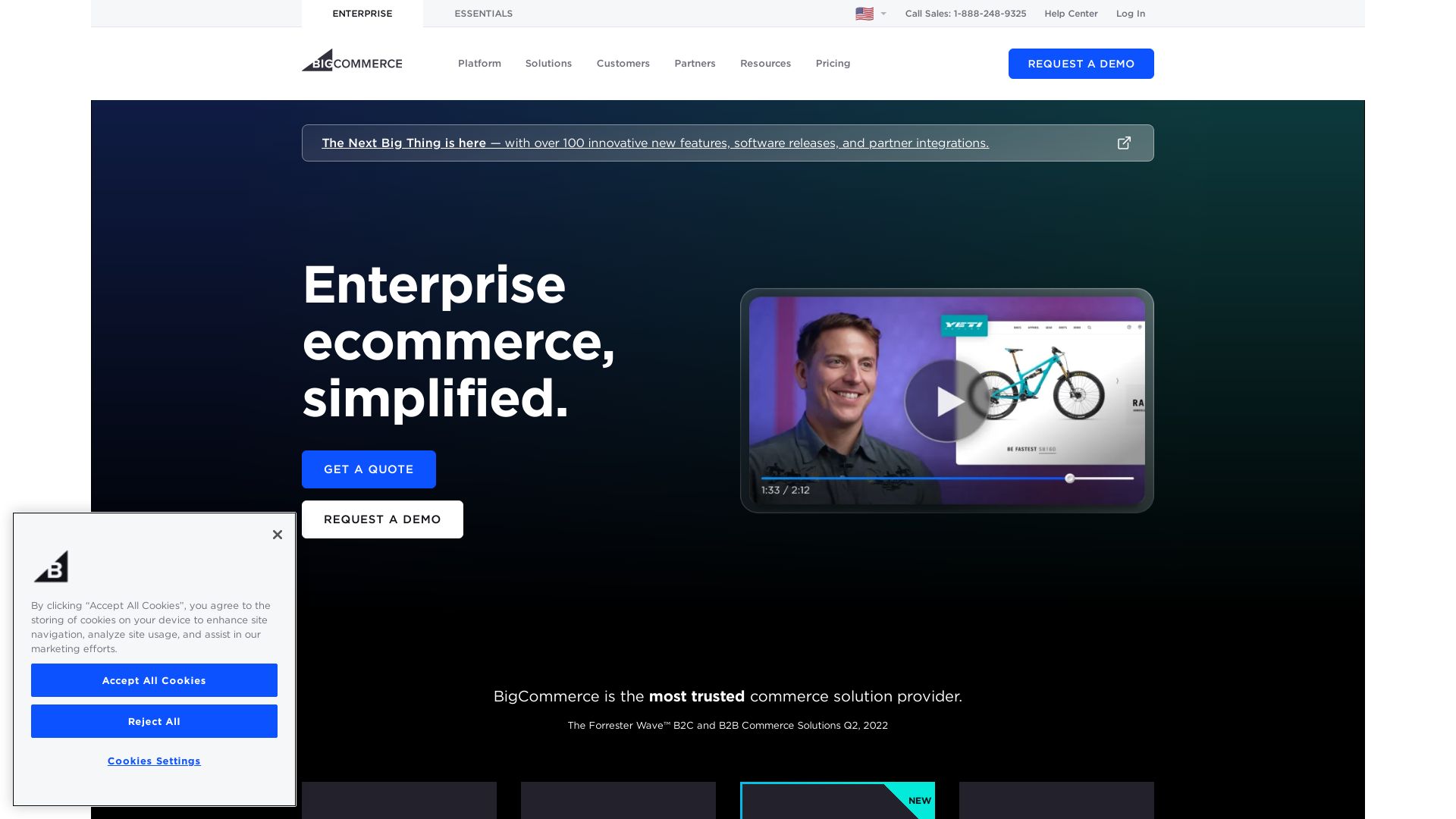
Have you ever imagined running your own eCommerce empire, but hesitated due to fear of the enormous codescape? Say hello to BigCommerce, the platform designed to make your e-commerce dreams come true, without needing a degree in Hieroglyphs…I mean, coding.
BigCommerce’s Sassiest Features
- More than 100 themes that facilitate a quick setup. It’s like having a wardrobe full of clothes for your online store, something for every season!
- How about an open API, for when you feel that creative itch and want to customize your store? Push HTML and CSS around as if you are an ancient scribe.
- Mobile-friendly responsive design. You can reach your customers, even when they’re sitting on the throne of…the bathroom.
- A power-packed Stencil Theme Platform with a What You See Is What You Get (WYSIWYG) editor? An artist’s true toolkit, if you ask me!
- Being Google AMP compatible, it allows you to reach Breakneck page-opening speed. Usain Bolt might feel jealous!
- With Blog tools in the bundle, you have your very own viral content-producing factory!
| Features | The Cool Spin |
|---|---|
| Inventory Tracking and Management | Feel like a true Lord of inventory. |
| Abandoned Cart Recovery Settings | Save your sales from the Bermuda Triangle of the internet. |
| Coupon Code Creation | Who doesn’t love a good discount party? |
Bits Where BigCommerce May Be a Little Bummer
- Setting expectations here – there is a learning curve. But then, fortune favors the brave, doesn’t it?
- Customizations require coding knowledge. Yeah, HTML and CSS are not exactly everyone’s cup of tea, but we got to work with what we have!
Precious Penny Matters: BigCommerce Pricing
The pricing isn’t mentioned in our top-secret guide, darn it! But we suggest you to buckle up, visit their website, and unveil this secret yourself.
When BigCommerce Can Be Your Knight In Shining Armor
Use Case 1: Small Businesses
Startups and small businesses can enjoy a field day with BigCommerce. Think of it as your online store’s friendly neighborhood Spiderman. Customization options, marketing tools, and responsive design make it the perfect sidekick.
Use Case 2: Mid-Market Businesses
Mid-market businesses can make BigCommerce their wingman. With features like inventory tracking and management, your business can have a birds-eye view of the operation.
Use Case 3: Enterprise
Even the big fish in the pond can find a partner in BigCommerce. A wide array of customization, seamless integration, and advanced features can be a sheer delight for all the tech whales out there.
Squarespace
A shining gem in the digital landscape, Squarespace is a dynamic website builder platform delineated by its focus on creative control and e-commerce solutions. A linchpin in web design, it provides an entire ecosystem for online store creation, fortified with expertly curated website templates and optimized with powerful digital marketing tools.
Squarespace Top Features
- Squarespace Blueprint: Paves the way for customizing template designs, offering unique digital architecture for your website.
- Ecommerce Capabilities: Facilitates creation and management of unlimited products, physical or digital, straight from your site.
- Analytics: Provides a backdoor to visitors’ behavior, enabling smart sales tracking.
- Integrated Shopping Cart: Makes online shopping a breeze with multiple payment gateways.
- Scheduling Capabilities: Lets your visitors schedule appointments or book classes, crafting a seamless digital experience.
- SEO Optimization: Gets you noticed with targeted SEO support and social media integration.
- Squarespace Advanced Commerce: Offers enhanced e-commerce features like carrier calculated shipping and abandoned cart recovery.
| Feature | Description |
|---|---|
| Automatic Transactional Emails | Streamlines the buyer’s journey with organized, timely communication. |
| Marketplace for Hiring Expert Service | Resource for employing Squarespace whizzes for tailoring your website to perfection. |
| Integration with Square | Connects your online and offline selling ventures, ensuring comprehensive inventory management. |
Squarespace Disadvantages
- Limited number of apps in the Squarespace Extensions (app store).
- Certain advanced e-commerce features like carrier calculated shipping, abandoned cart recovery, automatic discounts, and subscription products are locked behind the Squarespace Advanced Commerce plan.
Squarespace Use Cases
Digital Entrepreneurs
Unleash your e-commerce vision with the holistic platform that Squarespace provides, all with the added powerhouse of impressive design templates. Manage an endless array of products and keep track of sales with sharp analytics.
Creative Freelancers
Build an arresting web portfolio to showcase your talent with Squarespace’s stylish, customizable templates. Connect with prospective clients, manage scheduling, and foster a vibrant community.
Local Businesses
Expand your high-street shop into the digital realm with ease. Schedule appointments, sell products, and provide easy-to-use payment options, all while optimizing your site for local SEO.
Etsy

Established in 2005, Etsy is an online marketplace for vintage, handcrafted goods and rare collector’s items. With a global user base of 4.3M, Etsy is popular among individuals and small vendors.
Etsy Top Features
- User-Friendly Interface: Ensures an easy navigational experience for both sellers and buyers.
- Internal Analytics: Tracks orders, revenue, customer favorites and views for informed decision-making.
- Community Connection: Bypasses conventional advertising needs through in-app or Web-domain interaction.
- SEO Optimization: Enables customizable titles, product descriptions for better discoverability.
- Smart Logistics: Provides shipping cost calculation, label printing, product invoices and secure payment options.
- Educational Content: Housing insightful content to accelerate seller’s growth.
- Inbuilt App: Facilitates on-the-go shop analytics, order checks, consumer query resolution and shop setting modification.
| Feature | Description |
|---|---|
| Feedback Mechanism | Allows sellers to gather feedback and make adjustments based on data analytics. |
| Discounted Postage | Offers cost-effective shipping with discounts on postage rates. |
| Coupon Creation | Allows sellers to create coupons to attract more buyers. |
Etsy Limitations
- Limited Customization: Does not allow for unique domain and comprehensive site customization.
- Delayed Response Support: Customer support response is sometime delayed.
Etsy Pricing
Etsy imposes a listing fee of $0.20 per item. The transaction fee is 5%, along with a payment processing fee of 3% plus $0.25. Etsy Standard involves listing, service and payment charges. Etsy Plus costs $10 per month, providing extras beyond the standard. Etsy Pattern costs $15 per month, enabling eCommerce site creation.
Etsy Use Cases
Use Case 1: Independent Artisans
Etsy resonates with independent artisans hoping to reach a global audience. Its user-friendly interfaces and inbuilt shop app makes it easy to manage from anywhere.
Use Case 2: Vintage Collectors
For vintage collectors, Etsy’s extensive reach and niche audience provides the perfect platform to showcase and sell their unique items.
Use Case 3: Small Vendors
Small vendors seeking minimal upfront investment and simple logistics will find Etsy’s structure and pricing particularly appealing.
WordPress
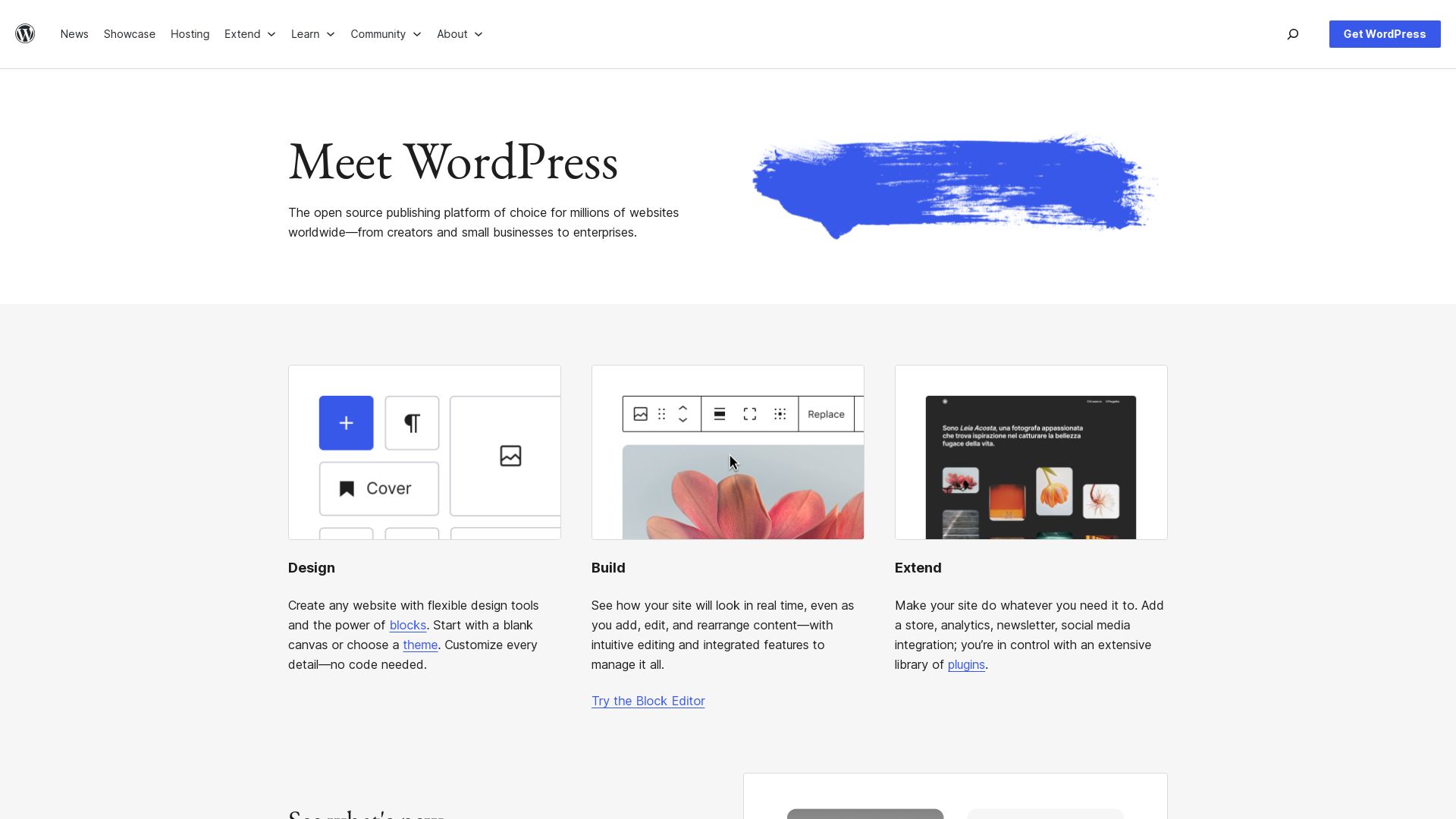
Embrace the power of WordPress, a dominant web application powering 40% of websites globally and boasting impressive use in the eCommerce sector thanks to its versatile plugin, WooCommerce. However, note that it is fundamentally not primarily an eCommerce CMS.
WordPress Top Features
- WooCommerce: A free, open-source, customizable plugin for establishing a seamless eCommerce platform. WooCommerce currently powers over 30% of online stores globally.
- Customizability: Over 1,200 eCommerce-focused WordPress themes available for personalization ensuring every site is unique.
- Payment extensions: Multiple gateway options with WooCommerce Payments, Stripe, PayPal, Afterpay, Authorize.Net, Square, Amazon Pay catering to various customer preferences.
- Optimized for SEO: Boost your web presence with the help of the Yoast SEO plugin that serves to create SEO friendly sites.
- Automated updates and staging site for seamless product testing and updates.
- Inventory management, real-time shipping prices, tracking codes and more for holistic eCommerce management.
- Site Security: Stay assured of your site’s integrity with automated backup and uptime monitoring features.
| Features | Description |
|---|---|
| Elastic Search: | A built-in feature for enhanced on-site search efficiency. |
| Plugin Auto-update: | Autonomous and seamless plugin updates for uninterrupted operations. |
| Ad-free Experience: | Custom domain option for a seamless user experience with no disturbing ads. |
WordPress Limitations
- Occasional plugin compatibility issues that may disrupt seamless website performance.
- Outsourcing costs for WordPress design and development can vary and might be high.
- It’s not primarily an eCommerce CMS, so there might be certain limitations in eCommerce functionality as compared to dedicated eCommerce platforms such as Shopify or Wix eCommerce.
WordPress Pricing
While WordPress itself is free, other essentials including domain registration, SSL, and hosting might average between $15-$50 monthly. Custom design services range approximately from $1,000-$10,000, and custom development begins at $25,000+. Various costs for plugins, marketing, and hosting apply. Additionally, WooCommerce and PayPal implement transaction fees of 2.9% + $0.30 per transaction.
WordPress Use Cases
Use Case 1 – Small Businesses
For small businesses looking for a budget-friendly platform that doesn’t compromise features, WordPress offers a goldmine of customizable options. Enhanced by WooCommerce, businesses can tailor sites to their visions, optimizing for SEO and employing helpful marketing and inventory tools.
Use Case 2 – Freelancers
Freelancers can leverage WordPress’s cost-effective domain and hosting prices to establish a strong online presence. With the array of available themes, freelancers can craft unique sites to showcase portfolios and establish their brands.
Use Case 3 – Large Enterprises
Large enterprises can benefit from the robust framework WordPress provides, handling complex needs with plug-ins and customization features. WordPress VIP plans make it an attractive CMS platform that aids in seamless business operations with enhanced features like automated updates, built-in Elastic Search and automated backups.
Drupal
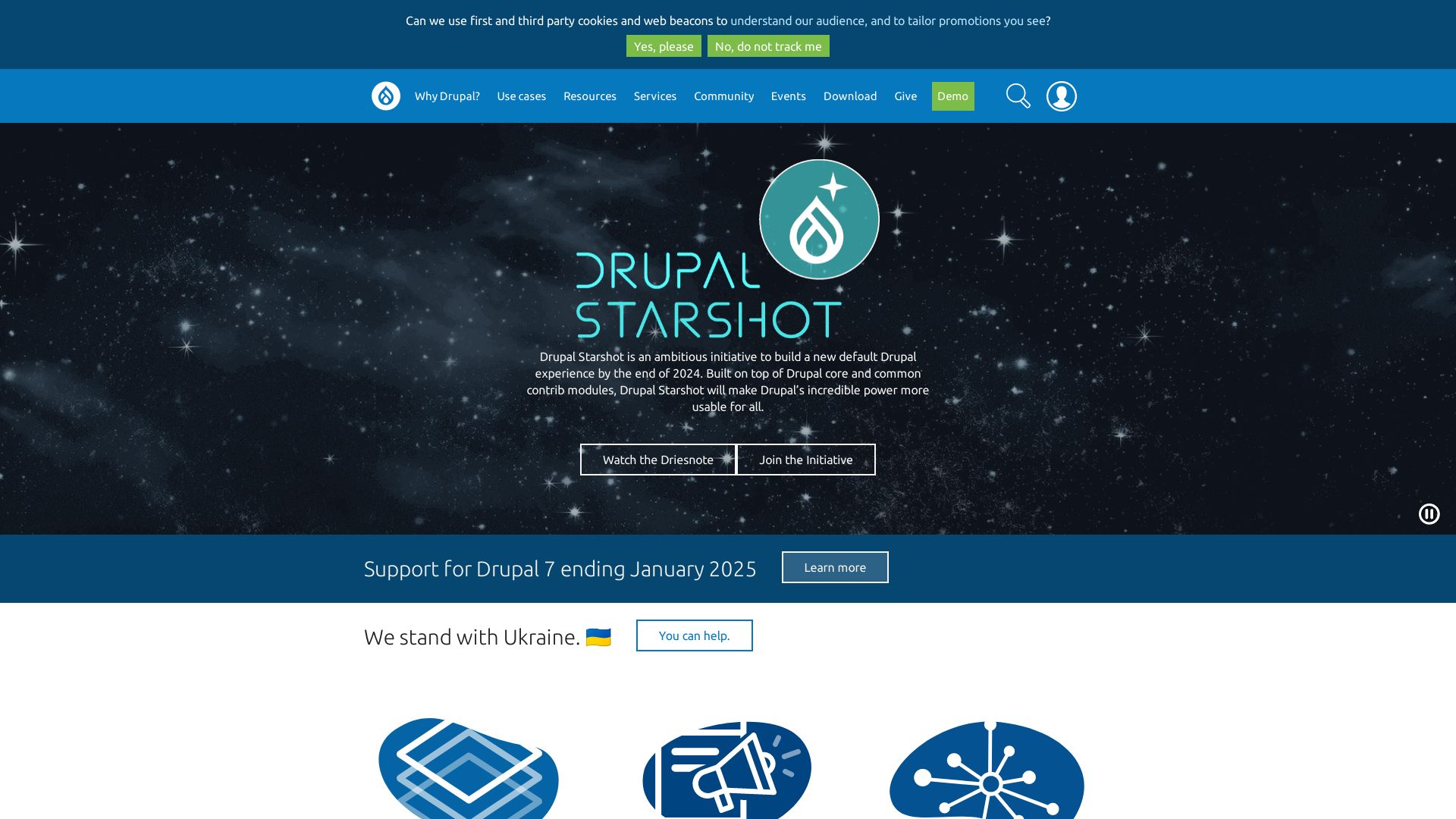
First launched in 2000 by students Dries Buytaert and Hans Snijde, Drupal now powers millions of websites globally. Thanks to its open-source nature and a large community of over 45,000 developers, it offers businesses full control, strong customization capabilities, and seamless integration options. Drupal stands out as a solid choice for building complex eCommerce and community websites.
Drupal Top Features
- Open-source eCommerce framework for seamless, rapid launch according to market changes.
- Facilitates creation of multilingual sites through four inbuilt modules, meeting international requirements for currency and tax.
- Offers global support and a large community-driven development platform.
- Responsive and mobile-ready eCommerce sites generated, thanks to its inherent responsive design.
- Ability to build headless commerce backend provider via JSON:API or custom REST resources.
| Development Stages | Modules |
|---|---|
| Analysis, planning, design, development, deployment, and testing are the stages involved. | Enables linking to platforms like Amazon, eBay, and Etsy |
| A modern framework suitable for API-first applications. | Allows customizations for user-driven sites. |
| Accommodates design aesthetic requirements with powerful content design strategies. | Features extensive support network of developers, consultants for assistance. |
Drupal Limitations
- Cost and complexity can escalate according to customization requirements and large eCommerce projects.
- Development and maintenance costs could be limiting for small businesses or startups.
Drupal Pricing
Being an open-source software, core Drupal is free to use. However, the cost of developing a Drupal website does depend on the project’s complexity, size, and features needed. Here’s a broader range: Basic Website in America could range from $4000-$10000, and a Large-scale business website in America could cost between $15000-$42000.
Drupal Use Cases
Use case 1
Businesses looking for an open-source platform to build powerful eCommerce sites would find Drupal’s flexibility and customization features helpful. The ability to link eCommerce websites with platforms like Amazon, eBay, and Etsy adds an edge.
Use case 2
Drupal’s inherent responsive design and capacity for creation of mobile-ready sites is an asset for business targets to build strong mobile presence.
Use case 3
Companies with international markets can utilize Drupal’s ability to create multilingual sites and accommodate international currency and tax needs, giving them a global reach.
Tiffany Brise
Content writer @ Aircada, patiently awaiting a consumer AR headset that doesn’t suck.



